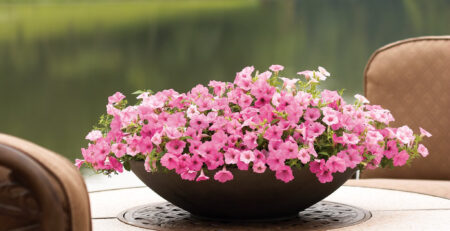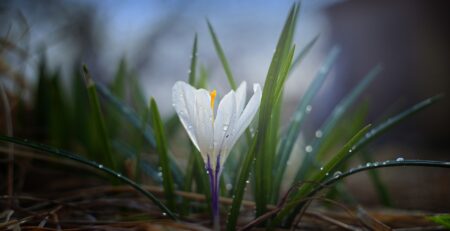11 Plants to Repel Bugs: An Eco-Friendly Solution
With warmer weather coming, so are the bugs. Insect pests like flies and mosquitoes can make enjoying your summer patio much less fun when all you’re doing is swatting at bugs. Besides mosquito candles and torches, you can plant a number of plants around your patio, pool, and property to keep your yard pest-free. Take a look at the list below of natural, bug-repelling plants.
Insects and other pests can be a nuisance, causing damage to crops, gardens, and homes. But before reaching for chemical pesticides, consider using plants that deter bugs and keep pests at bay. This eco-friendly solution not only helps protect the environment but also adds beauty and fragrance to your home and garden.
Visit Nunan Florist & Greenhouses today to pick up these insect-repelling plants and keep pests out of your garden! Plants have been used for centuries to repel insects and other pests. Here is a guide to some common plants that repel bugs.
1. Marigolds
Marigolds contain pyrethrum, a natural insecticide that repels mosquitoes, tomato hornworms, and other insects. These vibrant flowers are easy to grow and come in a range of colors, making them a popular choice of pest-repelling plants for garden settings and patios. These popular summer annuals deter plant lice, mosquitoes, and even rabbits. You can plant them near your front or back doors or even in vegetable gardens to keep rabbits and mosquitoes out.

2. Rosemary
Rosemary is not only a delicious herb for cooking but also a natural insect repellent. It repels mosquitoes, flies, and other flying insects. Rosemary repels a wide variety of bugs, so you can keep your garden protected with this fragrant herb! You can plant rosemary near windows or doors to keep insects from entering your home.
3. Mint
Who doesn’t love fresh mint? Mint is a hardy plant that is easy to grow and is known to repel ants, mosquitoes, and flies. Planting mint around your garden or doors will not only offer a pretty fragrance but also deter bugs such as spiders, ants, and mosquitoes! You can plant mint near windows or doorways or use the leaves to make a natural insecticide spray. However, be mindful when growing these pest-free plants because mint spreads quickly.
4. Basil
Basil is another plant that repels mosquitoes and other flying insects. It also attracts beneficial insects, such as bees and butterflies, to your garden. Plant basil around your back door to discourage mosquitoes and house flies from getting inside your home.

5. Citronella
A classic bug repellent, you can plant citronella in gardens or in containers near your doors to repel mosquitoes. Citronella is best known as an ingredient in insect-repellent candles and lotions. The plant itself is also a natural insecticide and repels mosquitoes and other flying insects.
Looking for the perfect way to add beauty and fragrance to your garden while keeping pests out? Look no further than Nunan Florist & Greenhouses.
6. Lavender
Lavender is a fragrant herb that repels moths, mosquitoes, and other flying insects. It also has a calming scent that can help reduce stress and promote relaxation. Gnats and mosquitoes hate the smell of lavender, which is a bonus if you love it! Plant lavender near windows and doors to both deter bugs and allow the aroma to waft into your home.
7. Chives
Chives are a type of onion that repel aphids, flies, and other flying insects. They also attract beneficial insects, such as bees and butterflies, to your garden. Japanese beetles and carrot rust flies won’t want to stick around your garden if you’ve got chives growing.
8. Petunias

Petunias are brightly colored annual flowers that repel asparagus beetles, tomato hornworms, and other pests. They are easy to grow and come in a variety of colors. These plants to deter bugs can simultaneously add color to your yard and repel beetles, aphids, leafhoppers, tomato worms, and a number of other pests.
9. Bay leaves
Bay leaves are a common herb used in cooking, but they also repel flies, moths, and other flying insects. Bay leaves repel flies and can also deter roaches in your kitchen. Place dried bay leaves on pantry shelves or near food to keep insects away.
10. Garlic
Garlic is a pungent herb that repels aphids, Japanese beetles, and other pests. Crush garlic cloves and mix them with water to make a natural insecticide spray. Plant garlic near roses to discourage Japanese beetles, maggots, carrot flies, moths, and aphids.
11. Chrysanthemums
Chrysanthemums contain Pyrethrin, a natural insecticide that repels mosquitoes, ticks, and other pests. They come in a variety of colors and are easy to grow. Mums are an excellent repellent for ants, Japanese beetles, roaches, bed bugs, spider mites, and ticks. These indoor plants that repel bed bugs are so effective due to a neurotoxin called Pyrethrin that many insect repellents use them in their mixtures.

Conclusion
These plants can help keep bugs and pests at bay in your garden or home. Choose the plants that repel bugs the best for your needs and enjoy a bug-free environment.
Ready to say goodbye to chemical pesticides and hello to eco-friendly pest-free plants? Visit Nunan Florist & Greenhouses for all your bug-repelling plant needs!
Frequently Asked Questions
1. What plants repel bugs?
There are several plants that deter bugs naturally. Some of the most popular ones include:
- Lavender: Lavender has a strong fragrance that repels moths, mosquitoes, and flies.
- Marigolds: Marigolds release a chemical that repels mosquitoes and other insects.
- Lemon balm: Lemon balm has a strong lemon scent that repels mosquitoes, flies, and other insects.
- Basil: Basil has a strong fragrance that repels mosquitoes and flies.
- Mint: Mint has a strong scent that repels flies, mosquitoes, and other insects.
- Rosemary: Rosemary repels mosquitoes, flies, and other insects.
- Thyme: Thyme repels a variety of insects, including mosquitoes, flies, and ants.
- Geraniums: Geraniums release a strong fragrance that repels a variety of insects, including mosquitoes, flies, and beetles.
These plants can be grown in your garden or in pots on your patio or windowsill using plant warmers, depending on the climate you live in. Additionally, you can crush the leaves and rub them on your skin for added protection against bugs.
2. What plant keeps the most bugs away?
It is difficult to say which plant keeps the most bugs away as it depends on the type of insect you want to repel and the local climate. However, some of the most effective plants to deter bugs include lavender, lemon balm, basil, mint, and marigolds. These plants release fragrances that mask the scent of people and food, making them less attractive to insects.
Lavender is especially effective in repelling mosquitoes and moths, while the lemon balm is particularly good at deterring mosquitoes and flies. Basil is known for its ability to repel mosquitoes and flies, and mint is a natural deterrent for a variety of insects, including flies, mosquitoes, and ants. Marigolds are known for their ability among plants that repel mosquitoes and other insects, and their bright, cheerful blooms make them a popular choice for gardeners.
Ultimately, the most effective plant for repelling insects will depend on the specific insects that are a problem in your area, as well as your personal preferences and the climate you live in.
3. Do mums repel mosquitoes?
Yes, mums, or Chrysanthemums, are believed to have insect-repelling properties and can help to keep mosquitoes away. These indoor plants that repel bed bugs contain a natural pesticide called pyrethrin, which is toxic to many insects, including mosquitoes. The flowers and leaves of mums release this chemical into the air, creating a natural barrier that repels mosquitoes and other insects.
It is important to note that while mums can help to reduce the number of mosquitoes in your area, they are not a foolproof solution and may not completely eliminate mosquitoes. If you are looking for a more effective way to keep mosquitoes away, it is recommended that you use a combination of insect-repelling plants and other methods, such as using mosquito repellent sprays or installing screens on windows and doors to keep mosquitoes out of your home.
4. What repels beetles?
There are several plants for bugs that are known to repel beetles, including:
- Marigolds: Marigolds release a chemical that repels various insects, including beetles.
- Garlic: Garlic has a strong odor that repels a variety of insects, including beetles.
- Chrysanthemums: Chrysanthemums, also known as mums, contain a natural pesticide called pyrethrin that is toxic to many insects, including beetles.
- Basil: Basil has a strong fragrance that repels a variety of insects, including beetles.
- Mint: Mint has a strong scent that repels various insects, including beetles.
- Rosemary: Rosemary repels a variety of insects, including beetles.
- Lavender: Lavender has a strong fragrance that repels a variety of insects, including beetles.
- Thyme: Thyme repels a variety of insects, including beetles.
These pest-repelling plants are for garden settings or pots on your patio or windowsill, depending on the climate you live in. Additionally, you can crush the leaves and rub them on your skin or clothing for added protection against beetles.
It is important to keep in mind that not all beetles are repelled by the same plants, so it is best to experiment with a few different plants to see which ones are most effective in your area. Additionally, it is recommended that you use a combination of insect-repelling plants and other methods, such as using beetle-repelling sprays, to get the best results.
Don’t let pests ruin your garden. Visit Nunan Florist & Greenhouses today to learn more about our selection of pest-repelling plants for garden or pot settings.









